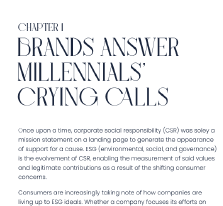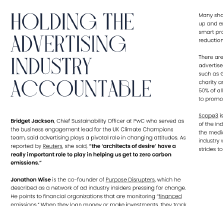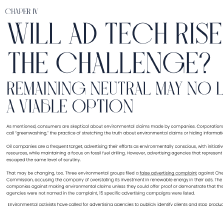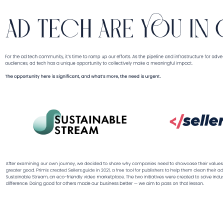CHAPTER II
THE WORKPLACE RESPONSE
-1.png)
ESG IS KEY TO TARGETING YOUNG TALENT.
A Deloitte survey of Millennial and Gen Z employees revealed that the way a company’s values align with their personal ethics is a critical deciding factor for them in choosing their place of employment – many citing climate change as their top social concern.
Another study by Porter Novelli says that purpose-driven business is even more important. 70% of employees reported they wouldn’t work for a company that didn’t express a strong purpose beyond profitability. Employees want to work for a company with integrity and feel that they are also contributing to meaningful causes.
Gen Z and Millennial ESG Response
90% of Gen Zers and Millennials are attempting to reduce their individual impact on the environment
48% of Gen Zers and 43% of Millennials are putting pressure on their employers to take action fighting climate change
About 1/4 of both groups say climate change is their top concern
HOLDING COMPANIES ACCOUNTABLE
Younger workers hold their companies to high standards when it comes to the way they are impacting their surrounding environment and society. Nearly 80% percent of Millennials say a company’s ESG policies have a major impact on their motivation and commitment to their work. For companies, this emphasizes the importance of demonstrating their commitment to ESG principles and presents them with yet another reason to act conscientiously.
With ESG becoming a central topic of concern, younger adults are becoming more and more educated, principled, and opinionated. They are not afraid to share their concerns with leadership and demand change. If issues are not addressed in a way that aligns with their moral compass, they are more likely to leave in search of an environment that will better coincide with their values. Today, with skilled workers in such high demand, employees have choices and they are not afraid to exercise them.
EMBEDDING ESG PRINCIPLES IN ORGANIZATIONS
Organizations need to embrace ESG principles on two fronts: external stakeholders and internal stakeholders. As we’ve seen, advertising commitment to sustainability and ESG issues can help improve brand perception and attract employees. However, it’s also important to create an internal culture that ties work to the mission.
ESG cannot be a topic that solely exists in the board meeting room, during investment presentations, or in the annual reports. It must also be embedded in the company culture and clearly defined in employees’ specific roles. This means infusing discussions about ESG principles in recruiting to find and attract diverse and well-suited employees.

Bringing this goal to fruition requires education, training, and skills. Companies have to consider setting visible targets for compliance, along with regular measurement and reporting of these undertakings. Some employers are going so far as tying performance evaluations and compensation to the ways their employees are meeting ESG objectives.
The KPMG global survey of sustainable reporting shows that 80% of the world’s companies are now providing reporting on sustainability. Companies are also increasingly digging into the impact of their practices. For instance, 40% of companies include potential financial risk from climate change in their reporting.
To be truly impactful, enterprises must take proactive steps to demonstrate a consistent commitment to living up to their ESG goals. If employees sense that their company is more talk than action, the intended message will fall flat and mitigate any potential gains.
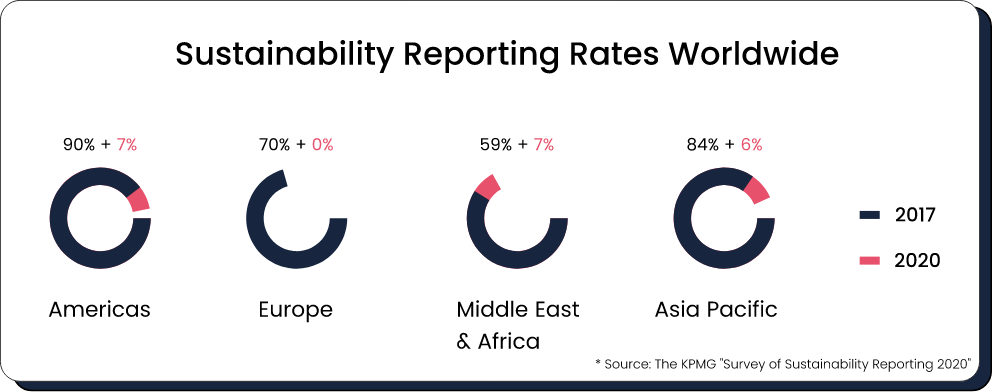
CHAPTER II
THE WORKPLACE RESPONSE
-1.png)
ESG IS KEY TO TARGETING YOUNG TALENT.
A Deloitte survey of Millennial and Gen Z employees revealed that the way a company’s values align with their personal ethics is a critical deciding factor for them in choosing their place of employment – many citing climate change as their top social concern.
Another study by Porter Novelli says that purpose-driven business is even more important. 70% of employees reported they wouldn’t work for a company that didn’t express a strong purpose beyond profitability. Employees want to work for a company with integrity and feel that they are also contributing to meaningful causes.
Gen Z and Millennial ESG Response
90% of Gen Zers and Millennials are attempting to reduce their individual impact on the environment
48% of Gen Zers and 43% of millennials are putting pressure on their employers to take actionfighting climate change.
About 1/4 of both groups have climate change is their top concern.
HOLDING COMPANIES ACCOUNTABLE
Younger workers hold their companies to high standards when it comes to the way they are impacting their surrounding environment and society. Nearly 80% percent of Millennials say a company’s ESG policies have a major impact on their motivation and commitment to their work. For companies, this emphasizes the importance of demonstrating their commitment to ESG principles and presents them with yet another reason to act conscientiously.
With ESG becoming a central topic of concern, younger adults are becoming more and more educated, principled, and opinionated. They are not afraid to share their concerns with leadership and demand change. If issues are not addressed in a way that aligns with their moral compass, they are more likely to leave in search of an environment that will better coincide with their values. Today, with skilled workers in such high demand, employees have choices and they are not afraid to exercise them.
EMBEDDING ESG PRINCIPLES IN ORGANIZATIONS
Organizations need to embrace ESG principles on two fronts: external stakeholders and internal stakeholders. As we’ve seen, advertising commitment to sustainability and ESG issues can help improve brand perception and attract employees. However, it’s also important to create an internal culture that ties work to the mission.
ESG cannot be a topic that solely exists in the board meeting room, during investment presentations, or in the annual reports. It must also be embedded in the company culture and clearly defined in employees’ specific roles. This means infusing discussions about ESG principles in recruiting to find and attract diverse and well-suited employees.

Bringing this goal to fruition requires education, training, and skills. Companies have to consider setting visible targets for compliance, along with regular measurement and reporting of these undertakings. Some employers are going so far as tying performance evaluations and compensation to the ways their employees are meeting ESG objectives.
The KPMG global survey of sustainable reporting shows that 80% of the world’s companies are now providing reporting on sustainability. Companies are also increasingly digging into the impact of their practices. For instance, 40% of companies include potential financial risk from climate change in their reporting.
To be truly impactful, enterprises must take proactive steps to demonstrate a consistent commitment to living up to their ESG goals. If employees sense that their company is more talk than action, the intended message will fall flat and mitigate any potential gains.
Sustainability Reporting Rates Worldwide
Americas
Europe
Middle East & Africa
Asia Pacific
2017
2022
.svg)
.svg)
.jpg)
